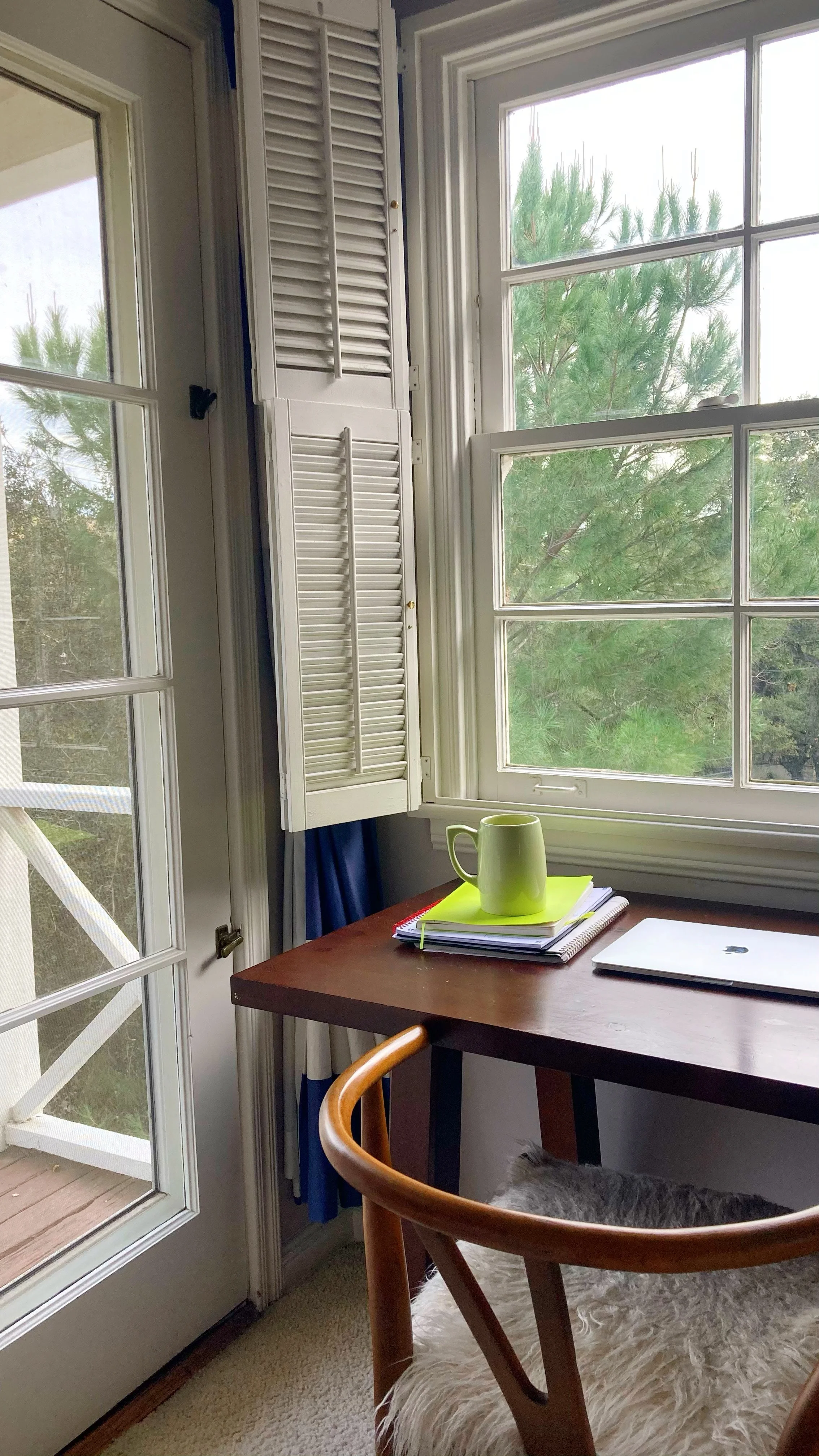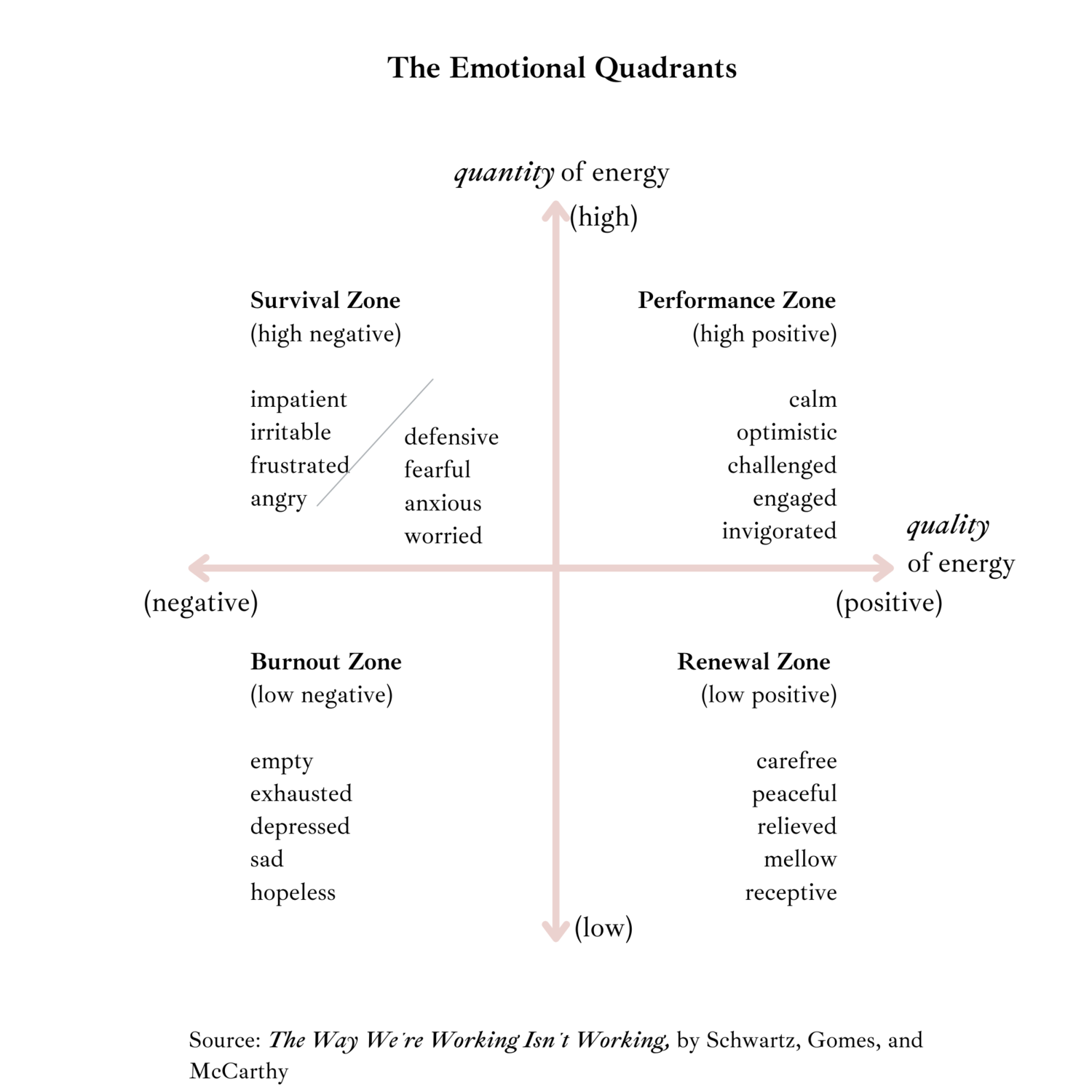Blog
When everything in life feels "hard"
A little while ago, my life coach (yes, I have one!) pointed out that I was saying that a lot of things were “hard.”
Wrangling young children at bedtime was hard.
My 16-month renovation was hard.
Having enough time for everything I wanted to do was — you guessed it — hard.
My coach challenged me to notice, as I moved through my days, what wasn’t hard. What was, in fact, easy? And when I noticed when something was easy, to just say to myself, “This is easy.”
Reader, I did it.
Reader, it turns out that a lot of my life is easy.
I found myself saying “this is easy” to myself, at least a handful of times a day.
When I had a quiet moment to journal in the morning.
As I took a breath and had a lovely lunch.
When I read a book after dinner, or snuck into my kids’ room at 9 pm to watch them sleep.
And, even more strikingly: I noticed that when I said “this is easy” to myself, several times a day, my day felt easier… without changing anything.
I think this happened because the *average* of my thoughts became more positive. I didn’t get rid of the negative ones, I just added more truthful positive ones.
(“Truthful” is an important part of that sentence. This wasn’t a practice about lying to myself, or self-gaslighting. Plenty of things remain hard or unpleasant — brushing a toddler’s teeth, anyone? — and I tell myself the truth about those things, too, with compassion.)
…
So today, I wanted to offer you an invitation to play with this practice.
If — like me — everything has felt “hard” lately, you might practice noticing what’s “easy.” Or maybe there’s a different word that has plagued you:
Has everything been “boring?” Maybe look for what is fun, or interesting, in your day-to-day.
Has everything been “frustrating?” Maybe look for what has “gone well” – or interactions that felt “helpful” or “supportive.”
Again, the point isn’t to deny your experience. Many things will likely remain hard, boring, and frustrating.
But also, we may be unfairly weighing the narrative towards the negative, by simply not noticing parts of our life that are the opposite of our habitual interpretation — and suffering because of it.
…
As always, I’m rooting for you. You’ve got this.
Katie
p.s. One of my clients said:
"These are lessons that I could potentially have learned "on my own" after another 1-2 decades of life experience, but the fact I have made such progress in 12 months means that working with Katie has easily been the best investment I've made in myself in my adulthood."
I feel so moved by her saying that. If you'd like to work with me — I currently have two openings for new clients — learn more + reach out here.
Want to receive essays like this every Sunday morning? Sign up for my newsletter!
Back to the basics: Your engine + your compass
I’m not a big New Years Resolution-type. It never made sense to me to set splashy goals in a season when I typically just need a good veg on the couch.
Instead, this January, I thought it could be fun to return to some of my core concepts — the things I tell clients day-in, day-out. The basics we all need.
For today: Let’s talk about the two things you absolutely cannot do without, to have a life that works for you:
An engine
A compass
A compass is what tells you what direction to go in. And an engine is what actually takes you there.
You need both.
If you have an engine but no compass, you can be driving around all day (or all decade), but it never quite feels like where you truly want to be.
If you have a compass but no engine, you know what you want but cannot freaking make progress towards it.
Typically, if someone finds their way to me, they’ve got an issue with one or both.
(If it’s both, I tend to treat the compass first, because there’s no use in having a functioning engine if you exhaust the car driving in random directions).
In the next few weeks, I’ll give a couple of ideas on helping you with both your Compass + your engine, but two questions + two ideas to start us off right this new year:
Question: Which of these do you tend to rely on more? Your compass, or your engine?
Idea: It could be an interesting experiment, this January, to let yourself give your dominant mode a rest, and let the other take the wheel for a bit. Compass-dominant people might have a really powerful month of checking in with themselves less, and powering forward. Engine-dominant people might have their minds blown if they slow down for a bit and really get directionality right.Question: Is any of these completely broken and needs to be taken to the mechanic to be repaired, or completely revamped?
Idea: If so, what would your “mechanic” be? A game-changing book? A podcast? A conversation with an insightful friend? A therapist or a coach? Here’s more about working with me, if you’d like.
…
As always, I’m rooting for you in the week (and year) ahead. You’ve got this.
Katie
p.s. Ready to work on both your compass and engine in 2024? I’d highly recommend working with me 1:1. Learn more here.
Want to receive essays like this every Sunday morning? Sign up for my newsletter!
The difference between reading a tip and actually making changes (hint: getting a coach can help)
A lot of people think that they just need a good tip in order to solve their problem. Just the right piece of advice.
But here’s the thing: Advice and tips – they’re easy to find.
Google any topic.
Walk into any bookstore.
Read any self-development newsletter.
You’ll find lots of tips on any topic — including whatever is bothering you right now.
How to feel less anxious, stressed, stuck, or uninspired.
How to stop using food or the internet in a way you don’t like.
How to work fewer hours without sacrificing quality.
How to heal from burnout.
How to have a better relationship with your partner, your friends, yourself.
There’s nothing wrong with tips — they can be quite useful. (Especially this essay, of course.)
And yet.
And yet, you could probably rattle off a list of “tips” to deal with any problem you currently have.
And yet, you still have those problems, don’t you?
…
But if you really want to change in a meaningful, lasting way — tips are usually not enough.
If you really want to change in a meaningful, lasting way —that’s when you need life coaching.
Every client I’ve worked with has incredibly personalized reasons why they’re in the stuck or anxious or tired or uninspired state they’re in. Working with me can help you identify those roadblocks — which are usually blind spots that you genuinely cannot see — and develop new, profoundly individualized ways of interpreting and responding to the same situations.
Then, we talk about actions. Sure, there might be a tip or two you’ve heard of before — but that’s not the real value. The real value is that you have a step-by-step, iterative, genuinely-doable process to get you from here to where you want to be.
No advice you read in a book or internet article could ever be so uniquely customized to your very particular fears, needs, strengths, and weaknesses.
…
I really hope you love these essays – but coaching with me is completely different than these essays.
It’s the difference between reading about an idea…and actually making a change that is profoundly right for you.
It’s way better.
I maintain a small, high-end 1:1 life coaching practice. If you’d like to be my next client, learn more or reach out here.
As always, I’m rooting for you. You’ve got this.
Katie
Sign up for my newsletter to get helpful + encouraging essays like this every Sunday morning. It’s free!
My favorite model for how to manage your energy levels + focus
Today, I’m going to start with a chart. Take a look, and then we’ll talk.
This is from The Way We’re Working Isn’t Working, by Tony Schwartz, with Jean Gomes and Catherine McCarthy. It describes four emotional zones you can be in, while you’re working.
The implications of it might blow your mind.
…
Let’s start by talking about the Performance Zone — the upper right quadrant.
To understand the Performance Zone, think about how you feel when you’re performing at your best — working effectively towards a specific goal. If you’re like most people (and Schwartz’s team has asked this question of thousands of people — athletes, artists, heart surgeons, teachers, cops, and more) you feel:
Engaged
Focused
Upbeat
Committed
Optimistic
The Performance Zone requires a lot of energy, but you also have mostly positive emotion — hey, that’s how it feels to be doing a great job working towards a specific goal.
…
If you’re like many people, you saw the Performance Zone + thought: Yeah, that looks pretty good. I think I’ll just stay there all day at work and be really productive.
But there’s something very, very important to know about the Performance Zone:
You can’t spend all of your time there.
In fact, for most knowledge workers, Schwartz’s research suggests that you probably can’t spend more than ~90-120 minutes at a time in the Performance Zone.
Yes, even if you want to spent more time in the Performance Zone, your brain will literally kick you out.
Most knowledge workers don’t know this. They start their day feeling fresh — engaged, focused; classic Performance Zone; and just aspire to stay that way. But then their brains get tired…and kick them out.
Where do they end up?
Typically, they end up in the Survival Zone (upper left): feeling mildly — or significantly — irritable, reactive, anxious, or distracted.
Or — perhaps even worse — in the Burnout Zone (lower left): feeling exhausted, depressed, even hopeless.
…
This is where the story gets pretty juicy, in my opinion. Because even though you cannot stay in the Performance Zone, you can control which zone you go to next.
One of the key ideas in The Way We’re Working Isn’t Working is the idea of “pulsing.” When you reach your limitations with the Performance Zone, you can consciously choose to “pulse” to the Renewal Zone.
In the Renewal Zone (lower right), you are — you guessed it — actively cultivating renewal. You feel relaxed, peaceful, laid-back, and serene.
Typically, this requires stepping away from your computer for at least a 15 minutes and doing something that would allow you to feel mellow, receptive, or peaceful. Things like:
Moving your body (walking around the block, stretching, doing a workout)
Looking out the window
Reading an actual, physical book or magazine for 10 minutes
Having a relaxing meal
Chopping some vegetables
Folding your laundry while listening to harp music (hey, you asked for suggestions)
It’s important to note: email or social media usually aren’t Renewal Zone activities. Typically, you will be too revved up to actually feel peaceful + receptive. Here’s more on that, if you’re interested.
…
Are you feeling skeptical about this whole “pulsing to the Renewal Zone” thing?
For most of my clients, it takes some practice with pulsing to really get the hang of it. You might be so accustomed to being agitated in your body all day, that actually calming down your nervous system sounds, well, impossible.
This does improve with practice. If you regularly offer your nervous system the chance to come down, it begins to learn how to relax.
And, even then, you may not get to “spa day” in your pulse to the Renewal Zone. But that’s okay.
Even a mediocre trip to the Renewal Zone is way, way more useful to you than the Survival or Burnout Zones. And once you’ve spent a bit of time in the Renewal Zone, you can — you guessed it — pulse back to the Performance Zone.
And, if you feel guilty about visiting the Renewal Zone during your workday? Read this.
…
Want the three-sentence summary?
1. Stop trying to work for more than 90 (or maybe 120) minutes at your knowledge-work job.
2. You’ll be more productive, paradoxically, by taking a renewal-oriented break.
3. (Instagram or email checking don’t count as a renewal-oriented break.)
…
Does this feel obvious? Impossible to implement? I’d love to hear!
As always, I’m rooting for you. You’ve got this.
Katie
If this essay resonated with you, you'll love my newsletter. Sign up for free + get new ideas every Sunday!
What’s possible with help from a life coach
Yesterday, I was talking to a client of mine.
He was telling me how great he’s feeling.
He’s super excited about the big career shift he’s about to make, but he also feels happy and focused at his current job.
Plus, he feels happy in his life as a whole. He’s started tinkering in the creative hobbies that make him fulfilled, he’s taking good care of his body, and he’s managing his energy and his time well. He’s put in effort to cultivate deeper relationships.
But just three months ago, it was a very different story.
I felt so overwhelmed, anxious, and so tired back then, he reminded me. I really didn’t think there was a way out. When we started working together, I just hoped I’d feel a tiny bit better.
Our conversation yesterday was about what thriving means to him, and what other opportunities there might be — beyond what he’s done already — to be thriving more consistently.
It would have felt *insane* to say that I wanted to be “thriving” when we started working together, he told me. I had no idea all this was possible.
And yet, here we are: thriving.
Just three months later.
…
I don’t tell you this story so that you can beat yourself up. Maybe you do feel overwhelmed or tired or anxious now.
I tell you this story to say: look what is possible.
Look at what is possible when you decide that you don’t want to feel this way anymore.
Look at what is possible when you decide: maybe I don’t have to figure it all out on my own.
So many people have been stuck in their lives + their heads for so long, that they don’t think feeling different, or being different, is possible.
Sure, maybe some small tweaks. But a big, life-shifting transformation like this? That kind of thing doesn’t really happen.
I want to say, with all the love in my heart:
You’re wrong.
Transformation is possible.
Look at what is possible.
And, as someone who has been coached extensively, and coached many others — 1:1 life coaching is one of the most potent vehicles for transformation I know.
If you’d like to learn more about coaching, and potentially become one of my clients, you can apply here.
…
And, as always, I’m rooting for you in the week ahead. You’ve got this.
Katie
p.s. I’m starting to have conversations now with potential clients for a September/October 2021 start. I fill spots on a first-come, first-served basis, so if you’re interested in working with me, I’d recommend applying sooner rather than later. Here’s the link to apply.
p.p.s. And above all: maybe what’s possible for you is more than you dare to hope for.
Sign up for my newsletter to get helpful + encouraging essays like this every Sunday morning. It’s free!
Nervous about hiring a life coach? Here's what you can expect
First things first! I’ll have 3 spots for new 1:1 life coaching clients in June! After that, I won’t have any openings until the fall. If you’d like to be next in line, you can join my waitlist here.
I’m curious: did reading that make you feel intrigued? Like: Maybe life coaching could be really helpful.
But did it also make you feel fearful? I bet it wouldn’t actually work. Or: It’s too expensive.
Today, I wanted to share the fears I have when hiring a coach — which just so happen to be the most common fears I hear from potential clients.
I hope they’re helpful to you, too.
…
Some common fears about hiring a life coach:
1. The coach will force me to do something I don’t want to do.
It’s scary to think about paying a lot of money for a coach, and then have that coach misunderstand us. Or try to force us to do something that doesn’t feel truly right for us.
I think it’s important to know: my job as a coach is to understand you as deeply as I can, and then to show you your own mind — so you can understand your reasons much more clearly, and make a decision that serves you best. We all have blind spots that are simply impossible to see on our own. And we all would benefit from being offered new ways or models for thinking about our current problems.
In other words: I don’t care what choice you make. You can leave your partner, or stay. You can leave your job, or stay. You can dye your hair blue, or leave it the same.
I just want to make sure that you know your reasons, and like your reasons.
2. I don’t have time or energy for coaching right now.
If you don’t have time or energy… you need coaching more than anyone.
Here’s why: most of us are contributing, in a significant way, to our lack of time and energy.
Of course, this isn’t to say that life circumstances don’t also contribute. Of course, they do — you’re busy! You have kids! And a big job!
But I will say it again: most of us are contributing, in a significant way, to our lack of time and energy.
I think that’s actually great news. Because if we’re contributing, then we can help ourselves get more time and energy. I help clients with this nearly every day of the week.
3. I’m worried that this coach isn’t absolutely perfect for me.
Fit absolutely matters, and it’s worth your time to research the coach you’re considering working with — do you like what she writes about in her blog or on social media? When you have a consultation together, do you resonate with what she says?
But also: your coach doesn’t have to feel like your soulmate to get you transformational results.
I don’t say that to be harsh; I say it because I have to remind myself of it, too.
Plus, you’re not going to know her as deeply, in your first interactions, as you will by the end of the coaching engagement. My affection for my coaches always grows over time.
4. It’s too expensive.
Good coaches are expensive. It’s true. I’m expensive, too.
And yet: the outcomes of coaching are, in my opinion, the most valuable outcomes that you could possibly achieve. Is there anything more valuable than feeling genuinely happier, more fulfilled, calmer, more successful in the work you want to do, and more connected to the people in your life?
And this is to say nothing of the genuine dollars-and-cents-in-the-bank-account outcomes that I frequently help clients achieve (which are often significantly in excess of coaching fees): promotions, raises, books written, fellowships earned, gigs booked.
Then there are the clients who avoid burning themselves out and then quitting their jobs to live in a van by the sea for a year. That’s significantly more expensive than my coaching fees. (Plenty of my clients choose to take time off, but it’s because they want to, not because they have to.)
My goal is always that my clients think that the money they spent on me was the best money they’ve ever spent.
…
As always, I’m rooting for you. You’ve got this.
Katie
p.s. one last thing: sometimes, there’s a bit of a jumping-off-the-diving-board feeling to hiring a coach. I’ve felt this every time I’ve hired a coach. And I’m a coach myself!
I think that making a big investment may always feel like jumping-off-a-diving-board to me, and that doesn’t mean it’s the wrong decision.
So I’ll offer one last time:
If you’re interested in working with me 1:1, you can learn more here.
I have just a few spots available in June, and several more in October — and I fill the spots on a first-come, first-served basis, starting with folks at the top of my waitlist. If you’d like to work with me this year, I’d recommend getting on the waitlist ASAP.
Here’s the link to learn more or join the waitlist.
Sign up for my newsletter to get helpful + encouraging essays like this every Sunday morning. It’s free!
My three pieces of advice for Highly Sensitive People (HSPs)
Last week, I shared that I’m a Highly Sensitive Person (HSP).
Put simply, HSPs are more sensitive to stimuli— both internal (feelings, thoughts) and external (noises, light, other people’s feelings). If you’d like a much more thorough discussion of the temperament, check out my essay from last week.
Learning more about the temperament helped me immensely — it helped me both manage challenges that arose from having it and also played to my strengths as an HSP. It turns out that many of my clients are actually also HSPs, and what I learned was often helpful for them, too.
So, today I wanted to share three pieces of advice I often give to Highly Sensitive People.
1. You may feel weird.
Being a Highly Sensitive Person means, definitionally, that most people are not like you. Dr. Aron’s research suggests that ~20% of the population are HSPs. That means, of course, that 80% of the population is not highly sensitive.
Have you ever felt “weird” because, for example, you felt sensitive to internal or external stimuli? Or because you seemed to get tired more easily than others? That would make sense — it’s likely that ~80% of the people around you simply don’t feel sensitive in this way.
Many HSPs grow up with painful internal stories about themselves. They beat themselves up for being “too sensitive.” Or they try to hide, ignore, or suppress that sensitivity. In the era of easily available food and technology, this is relatively easy to do.
But it’s important to name: there is nothing wrong with you.
Having Sensory Processing Sensitivity (SPS) — the core trait of HSPs — is simply a personality trait or a temperament. It is neutral. It is not a disorder (there is something called “Sensory Processing Disorder;” but that’s different.)
But, I hope it brings you comfort to know: about 20% of people are like you! They are also Highly Sensitive! Though, many HSPs learn to survive in the world by hiding (or ignoring, as mentioned above) their sensitivity, so the full 20% can sometimes be hard to find.
But once you start looking for them, you can usually find them. If nothing else: you know me!
2. There are strengths associated with being an HSP!
I’m going to say it again: There are strengths associated with being an HSP!
I emphasize this because I think many HSPs — me included — spend most of our lives bemoaning their weaknesses. Even if you’d never heard of an “HSP” before you read this post, you were likely acutely aware of your “weaknesses” :
You seemed to get tired more easily than other people
You were emotionally more sensitive
You were more sensitive to stimuli like light or sound.
All of that can be frustrating to others — and ourselves. Why can’t I just have more energy? Why can’t I just stop being so sensitive?
And yet: there are huge strengths associated with being an HSP. In my personal life, here’s a few ways in which I think my sensitivity is a strength:
It makes me a better coach.
I pick up on extremely subtle input from my clients — a single word that they’ve chosen, or a subtle facial expression or body movement.
It allowed me to grow as a person.
I’ve experienced enormous personal growth in my adult life — and have changed so much about how I engage in relationships, work, my environments — and, of course, how I eat. I am capable of deeply investigating myself — pulling apart all kinds of subtle feelings, thoughts, and sensations.
It makes me a better partner and friend.
I can pick up on very subtle signals from my husband, or friends. Sometimes I have to put this information to the side + not inquire about it because it’s not my place to mention! But it often allows for deeper intimacy, communication, and trust.
It makes me a smarter person.
If you are processing information more deeply in your brain — a core trait of HSPs — you will likely understand it better, and be more capable of making new connections or insights. As I mentioned last week, Aron says that many researchers on giftedness say that there can be a strong correlation between intellectual giftedness and HSPs. I have plenty of insecurities (plenty!!), but not being smart isn’t one of them. And I do think that my sensitivity is linked to this.
I don’t share these strengths to brag. I share these strengths because, for years, I bemoaned the challenges that were associated with being an HSP (I get tired so easily! I am so freaking sensitive to myself! And the outside world!!).
And yet: this list includes some of the things I like best about myself and some of the things I am most proud of in the world. I don’t think I would be as good at what I do, or that my relationships would be as deep if I wasn’t an HSP.
So, I will say it again: being an HSP is simply a temperament. There are both strengths and challenges associated with the trait. BOTH.
3. HSPs may need to take themselves more seriously.
The research strongly suggests that as children, HSPs are more affected by their environment than non-HSPs.
In a negative environment (physically or emotionally unstable), HSPs do worse than non-HSPs on metrics from health to happiness to academic achievement. But, in a positive environment (physically and emotionally stable), they do better on all of those same metrics.
Did you catch that? In a positive environment, HSPs do better than non-HSPs.
In my own life, and in working with my 1:1 life coaching clients, I find this to also be extremely true for adults. In a very challenging environment (anything from long hours at work to a home situation that doesn’t work for them), HSPs can really struggle — perhaps more than non-HSPs would. This can be very frustrating and discouraging for them. (It was for me!)
But in a good environment, with the right support? HSPs freaking THRIVE.
I think this means that HSPs — once they are adults and have control over their environment, support, and opportunities — need to take themselves more seriously. Many of us have thoughts like, “oh, I should be able to handle this challenging situation,” or “I don’t need help; I should be able to figure it out on my own.”
But let’s review: HSPs are more negatively impacted by negative environments. And often do better when they are in a positive environment, with good support.
So yes, you could push through. You will survive. But: if something is in your control (a job, a place to live, or the decision to get support or not) — it’s worth asking: why are you making things harder on yourself?
And: Is choosing to make things harder really serving you?
…
Oh, and one more thing? And if you’re reading this essay, there’s a decent chance you’re an HSP.
Dr. Aron, a therapist herself, says that HSPs are 20% of the population, but 50% of all therapy clients. This is partially because — as I mentioned above — HSPs can be more sensitive to their environment and need more support. But also, HSPs tend to value depth, so they enjoy therapy and personal development.
I think that this also makes them more likely to read essays on topics about meaning + satisfaction :)
So I’ll remind you, one last time:
If you are highly sensitive, there’s nothing wrong with you.
It’s simply a personality temperament — and about 20% of the population has it.
There will be challenges associated with that temperament, and also unique strengths.
So the key question is: how will you play to your strengths, and manage your challenges?
As always, you’ve got this. I’m rooting for you.
Katie
Did you like this essay? Sign up for my newsletter to get helpful + encouraging essays like this every Sunday morning. It’s free! :)







